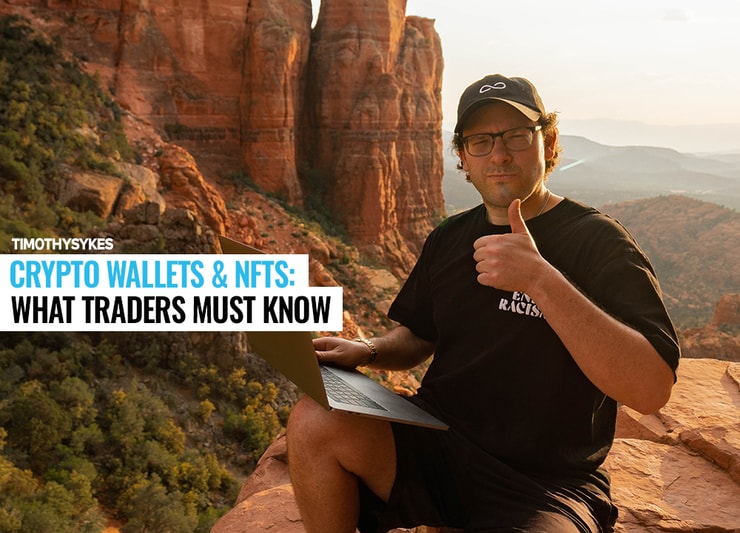A trader needs the right resources to stay in the game — the right broker for your trading style, a great stock screener, and tools like StocksToTrade’s Breaking News Chat to give you an edge.
Now that I’m jumping head-first into the non-fungible token (NFT) market, I have a similar approach. I want all the armor and resources I can possibly get. That starts with the basics, like a crypto wallet.
You’ve probably heard of NFTs — if you want to learn how I’m taking advantage of the opportunities of this high-potential market, join me on Wednesday, March 30 at 8 p.m. Eastern for a once-in-a-lifetime event…
But you may not know what a crypto wallet has to do with NFTs or how to get started with one. Keep reading — here’s what you need to know…
Table of Contents
What’s a Crypto Wallet?

Your cryptocurrencies are on the blockchain — a public digital ledger that logs transactions.
To access your cryptos, you have a private key. These keys are crucial. They prove that you’re the owner of the currencies and enable you to make transactions. Your crypto wallet stores your private keys.
There are two key types of crypto wallets: hot and cold wallets. Here’s the difference…
Hot Wallet
A hot wallet is digital storage that’s connected to the internet. You can access it on your computer or through an app on your phone.
Some examples of hot wallets include Phantom, Coinbase Wallet, and Metamask.
More Breaking News
- Transocean Faces Scrutiny in Valaris Merger Amid Shareholder Concerns
- European Wax Center Signals Confidence with Financial Projections Boost
- Kyndryl Holdings Stock Shows Mixed Performance Amid Market Turbulence
- ALAB Stock Climbs Amid Strategic Moves and Strong Financial Indicators
Cold Wallet
A cold wallet is NOT connected to the internet. It’s on a device that keeps your crypto info offline. One popular type of cold wallet is a hardware wallet. It looks like a USB drive, but there’s an important difference … Where a USB drive can only store your keys, a hardware wallet contains your key, and you need to physically approve transactions.
Two popular hardware wallets are Ledger and Trezor.
Why Do You Need a Crypto Wallet?
Crypto wallets store your NFTs and crypto tokens. This is really important, because if you forget or don’t have access to these private keys, you lose access to your cryptocurrencies.
Without access, you can’t process transactions.
What’s the Best Crypto Wallet?

That’s like another question I hate: What’s the best broker? I often say that I go with the one that sucks the least — but check out the deal I started with this broker. But really, what you have to think about is your specific situation and goals and what will be the best fit for you.
Start With the Blockchain
NFTs are units of data stored on a blockchain. Different blockchains provide different markets for NFTs.
Ethereum is one of the biggest blockchains for NFTs. It has a huge market, NFTs generally command higher prices, and the network’s established and highly secure.
But they don’t own the NFT marketplace.
There are several up-and-coming blockchains for NFTs, like Polygon and Solana. They have a few advantages…
Both have lower “gas fees” — a term for transactions on the blockchain. They can also process transactions faster than Ethereum.
One of the reasons I like Solana is that various innovations like its “Proof of History” mechanism optimize its speed and make it more environmentally friendly than a blockchain like Ethereum. I try to practice what I preach with my charity, Karmagawa!
Which Crypto Wallet Should You Choose?

There’s not one answer to this question. Think about it like choosing a brokerage account for trading. They all have their strengths and weaknesses. For instance, if you’re a short-seller, you want to find a broker that has shares to short and good borrow fees.
Blockchains obviously aren’t brokers. But you still have to think about your objectives.
First, think about the advantages and disadvantages of a hot wallet vs. a cold wallet.
Hot wallets are convenient, but there’s a higher risk of getting hacked than with a cold wallet. That’s a real concern. Several people have suffered staggering losses due to hot wallet hacks.
While a cold wallet is harder to access by outsiders, you could lose it or destroy it by accident.
Next, if you’re interested in NFT transactions, you need to consider the market you’re interested in. For instance, a Phantom wallet is a popular option for NFT transactions on the Solana blockchain. But if you’re interested in the larger market on Ethereum, you might want to consider a different wallet.
Wanna Join the Club?
I was initially skeptical of NFTs … and I changed my mind. In fact, I’m even more excited about NFTs right now than I am about penny stocks! The opportunities out there are incredible — they can’t be ignored.
If you’re ready to diversify and maximize on this once-in-a-lifetime chance, join me for this event. Don’t sleep on this — I’m even giving away a limited supply of my first NFT collection!
Get access now!
Do you have a favorite crypto wallet? Are you excited about NFTs? Leave a comment below and tell me what you think!



Leave a reply